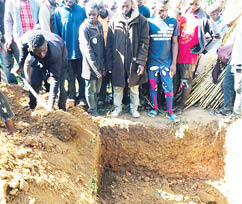Plateau State had in the last eight years witnessed relative peace from the two decades of ethno-religious violence that has claimed hundreds of lives with properties worth millions of naira annihilated. The usual crisis, largely between pastoralists and farming communities, had reduced to the barest minimum with virtually all warring parties interacting with one another peacefully.
But since the start of the campaigns for the last general elections, attacks and killings in various communities across the state escalated.
Between April and May this year, more than 200 people including women and children were killed in the villages of Mangu, Barikin Ladi and Riyom LGAs of the state. In Mangu alone, more than 150 people were confirmed killed in a night attack and houses burnt in May in two communities of Kubwat and Fungzai in the Kombun district of Mangu Local Government Area.
Muwaghagvul communities accused herders of attacking their village. But the leadership of Miyetti Allah Cattle Breeders Association of Nigeria (MACBAN), through its state chairman, Nuru Abdullahi, denied the allegation. The chairman, instead, accused the Muwaghagvul community of killing herders on April 17 in Maitumbi community. The leadership of Muwaghagvul Development Association had also denied the allegation.
13 killed in Plateau farmers-herders clashes
PTDF deploys fake certificate detection technology
The renewed crisis however has taken a new turn of what is described as “tit-for-tat” attacks and killings particularly between farming communities and the Fulani herders. The two warring parties often blame each other for being responsible.
There were reports of incidents of gunmen alleged to be Fulani invading communities killing innocent souls and burning their houses in the name of revenge. On one hand, farming communities are also accused of blocking roads and killing innocent travellers, especially herders, in the name of retaliation for an attack launched against their people.
The recurrence of this trend has led many to describe the situation as “tit-for-tat” attacks between pastoralist and farming communities.
The problem started on April 17 as a result of disagreement between herders (Fulani) and farmers (Muwaghagvul) in Maitumbi community of Mangu LGA, which led to the killing of many people and burning of houses.
On June 11, two herders were killed in Fas community of Riyom LGA where they were returning from rearing and suddenly, shot dead by gunmen. Hours after the incident, no fewer than 21 persons, including a clergyman, were killed while several others were injured in a Sunday night attack in Rim, Jol, and Kwi communities of Riyom LGA and Gana-Ropp community in Barkin Ladi LGA. Many residents described it as a reprisal attack. All the 21 victims who are of Berom parentage were killed in their sleep.
Two days after the attack on the said villages, some youths blocked Hiepang-Barkin Ladi road, stopped a vehicle and killed a Fulani herder who was returning from cattle market in Bukuru, Jos South LGA of the state.
On the same day, an attack was launched on Chit, a Berom community, where five members of the community were killed and 50 cattle belonging to the community were rustled.
Similarly, on June 15, five herders, who were returning from Bukuru cattle market, were waylaid by gunmen around Rawuru community, and a day after, gunmen invaded the community and killed eight persons.
Both Berom and Fulani have accused each other of the killings.
Reacting to the incidents, the Publicity Secretary of Berom Youth Movement (BYM), Rwang Tengwong, said his group could understand why the sudden attacks on their communities.
He said: “We cannot even say what the problem is.
We have coexisted with farmers for a long time. We do ask ourselves this question; whether it is a crime to host herders in our communities. We have lived with their forefathers peacefully. Why the problem now? Without sentiment, let us look at this issue with all sense of sincerity.
`We know that criminality does not end with the Fulani. Every tribe has elements of criminality. But until we genuinely agree to expose these criminals, the problem continues.
“I can’t tell you the genesis of the recent killings. It started in the communities of Mangu. We don’t know how the crisis started in Mangu but all of a sudden, it jumped to communities in Barikin Ladi and Riyom. Since it came to these communities, it has not stopped.
“If, for example, some people attack your cattle, the next civil way is to report the case to relevant authorities. If nothing is done, at least, you have a justification. It would be registered that you have made an effort to get justice.
“Peace is all about you and me. If we decide that all security agencies should leave Plateau State so that we can live in peace, we will. We should not wait until the security agents come to enforce peace. If we say retaliation is the only means to cool the anger, when are we going to get peace? When will this round of violence end?
Abdullahi Garba Muhammad, who is the state chairman of Gan Allah Fulani Development Association of Nigeria, said the problem between pastoralists and farming communities is purely the issue of land.
“There is nothing short of what I am telling you. The Berom in particular are agitating that we must leave their land which we feel that they don’t have the right to tell us to leave where we are today, because we are part of the land.
“Not only in Plateau; in the whole of sub-Saharan Africa, any developed community or town was originally formed by Fulani before later moved to the hinterland as the community was growing. We must tell ourselves the truth; the major problem revolves around the so-called land grabbing. We are not land grabbers. All we know we are also indigenes like any other person, he said.
Mobile police officers deployed to trouble areas
The Plateau State Commissioner of Police, Bartholomew Onyenka, on Saturday deployed Mobile Police Force (MPF) personnel across troubled LGAs of the state.
The commissioner, who was addressing the deployed officers at the state headquarters of the command, said the decision became necessary in response to several killings in the state and to bring the perpetrators to justice and restore peace in the state.
The commissioner ordered all the personnel deployed to be very vigilant while carrying out their constitutional duties and warned that any officer found engaging in any illegal act would be severely punished.
The CP also called on the people of the state to remain calm, vigilant and report any suspicious activity in and around them as the police are committed to upholding the law, and ensuring the safety of all the inhabitants of the state, adding that they should always remember that security is everybody’s business.
The Secretary to the State Government (SSG), Arch. Samuel Nanchang Jatau, who was present at the command headquarters to witness the deployment, noted that the deployment of these units was an effort to enhance security and maintain law and order in the state.
The Director, Cabinet and Special Services, Office of the SSG, Mr Nanman Jonah Kparbong, who was also present highlighted the government’s commitment to ensure the safety and security of its citizens, and the provision of necessary resources to support law enforcement agencies in the execution of their duties.
Governor Mutfuwang calls for emergency meeting
Reacting to the recent killings, the Plateau State governor, Barrister Caleb Mutfuwang, in a statement by his Director of Press and Public Affairs, Gyang Bere, summoned an emergency security council meeting with heads of security agencies in the state, and directed them to carry out their constitutional responsibility of protecting lives and properties of the citizens.
He said: “You all know what has been happening in the state; killing, burning of houses and looting of houses that were vacated by the locals. The essence is for us to review and possibly deploy security in some areas where we feel that there is no security presence. We are going to put in more efforts in ensuring that security personnel are deployed,” the governor said.

 Join Daily Trust WhatsApp Community For Quick Access To News and Happenings Around You.
Join Daily Trust WhatsApp Community For Quick Access To News and Happenings Around You.
![palestinians hold eid al adha prayers by the ruins of ar rahma mosque destroyed by israeli air strikes, in khan younis, in the southern gaza strip. [mohammed salem reuters]](https://dailytrust.com/wp-content/uploads/2024/06/palestinians-hold-eid-al-adha-prayers-by-the-ruins-of-ar-rahma-mosque-destroyed-by-israeli-air-strikes-in-khan-younis-in-the-southern-gaza-strip.-mohammed-salem-reuters-150x150.jpg)

